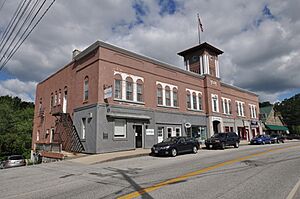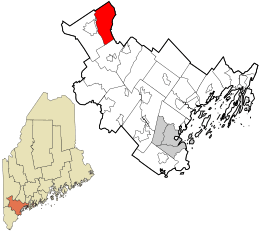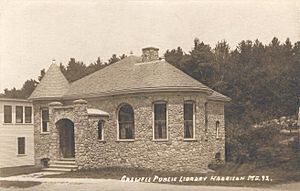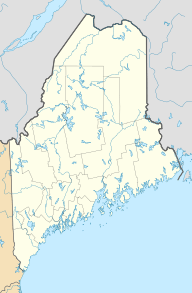Harrison, Maine facts for kids
Quick facts for kids
Harrison, Maine
|
|
|---|---|

The Ballroom (2014)
|
|

Location in Cumberland County and the state of Maine.
|
|
| Country | United States |
| State | Maine |
| County | Cumberland |
| Incorporated | 1805 |
| Villages | Harrison Bolsters Mills |
| Area | |
| • Total | 36.81 sq mi (95.34 km2) |
| • Land | 33.19 sq mi (85.96 km2) |
| • Water | 3.62 sq mi (9.38 km2) |
| Elevation | 577 ft (176 m) |
| Population
(2020)
|
|
| • Total | 2,447 |
| • Density | 74/sq mi (28.5/km2) |
| Time zone | UTC-5 (Eastern (EST)) |
| • Summer (DST) | UTC-4 (EDT) |
| ZIP code |
04040
|
| Area code(s) | 207 |
| FIPS code | 23-31600 |
| GNIS feature ID | 0582513 |
Harrison is a town located in Cumberland County, Maine, in the United States. It's known as a historic place for vacations and sits right between Long Lake and Crystal Lake. In 2020, about 2,447 people lived there. Harrison is part of the larger Portland area.
Contents
History of Harrison
The land where Harrison now stands was first given to James Otis and others in 1771. This was a reward for their service in a battle that happened in 1690. In 1797, this area became known as Otisfield.
On March 8, 1805, Harrison officially became its own town. It was created from parts of Otisfield and Bridgton. The town was named after Harrison Gray Otis from Boston, who owned a lot of land there.
Early Settlers and Industries
In 1792, two brothers, John and Nathan Carsley, came from Gorham. They built a camp and cleared some land in Harrison. John Carsley and his wife stayed, making them the town's first permanent settlers. More pioneers arrived, building log houses and using moss to fill in the gaps.
The water flowing from Crystal Lake into Long Lake was very important. It provided water power for early businesses. James Sampson built the first sawmill (for cutting wood) and gristmill (for grinding grain) in Harrison village. Over time, other businesses started up. These included a wire-making shop, a blacksmith (who worked with metal), a shingle mill, and a shoe shop.
Scribner's Mill, which is now a museum, was built in 1847 on the Crooked River. Another mill, the Bear River Woolen Mill, was built in 1867 but was destroyed by fire in 1872.
Canals and Steamboats
In 1832, the Cumberland and Oxford Canal opened. This canal connected Portland to Sebago Lake. It had 27 locks, which are like water elevators, to lift boats up to Sebago Lake. From there, boats could travel up the Songo River to Brandy Pond, and then to Long Lake.
The canal was originally planned to go even further, but it ended in Harrison. This made Harrison a busy center for trade and transportation. There were many wharves (docks) and warehouses along the shore.

In 1847, the Sebago & Long Pond Steam Navigation Company built the Fawn. This was the first steamboat to travel on the lakes and waterways. It was designed to be shallow so it could navigate the winding Songo River. Passengers sometimes had to move to different sides of the boat to help balance it!
Tourism and Railroads
The lakes became a popular spot for summer tourists. The Elm House, later called The Elms Inn, opened in 1860. In 1870, a railroad line reached Sebago Lake Station. This made the canal less important, and it was eventually closed.
Starting in 1898, the Bridgton and Saco River Railroad, a special narrow gauge train, brought people and goods directly to Harrison.
In 1906, the Harrison Hotel opened. Many summer camps also started, like Camp Kineo for boys. Today, Harrison is still a popular place for recreation. It is also home to Fernwood Cove, a summer camp for girls on Island Pond.
In 1936, the Historic Deertrees Theatre was built. It still hosts many plays, operas, and music performances, including the Sebago Long Lake Music Festival.
Geography
Harrison covers a total area of about 36.81 square miles (95.34 square kilometers). Most of this is land, with about 3.62 square miles (9.38 square kilometers) being water. The Bear River and Crooked River flow through the town.
Two main roads, Route 35 and Route 117, pass through Harrison. The town shares its borders with Bridgton to the west, Waterford and Norway to the north, Otisfield to the east, and Naples to the south.
Crystal Lake
| Crystal Lake | |
|---|---|
| Coordinates | 44°07′N 70°40′W / 44.117°N 70.667°W |
| Primary outflows | Long Lake |
| Basin countries | United States |
| Max. length | 1.5 mi (2.4 km) |
| Surface area | 446 acres (180 ha) |
| Max. depth | 65 feet (20 m) |
| Water volume | 14,254 acre⋅ft (17,582,000 m3) |
| Surface elevation | 308 ft (94 m) |
Crystal Lake, once called Anonymous Pond, is located north of Long Lake. Its water flows into Long Lake right through the center of Harrison. This lake is a good place to find Smallmouth bass, and you might also find a few lake trout.
Population and People
| Historical population | |||
|---|---|---|---|
| Census | Pop. | %± | |
| 1810 | 439 | — | |
| 1820 | 789 | 79.7% | |
| 1830 | 1,068 | 35.4% | |
| 1840 | 1,243 | 16.4% | |
| 1850 | 1,416 | 13.9% | |
| 1860 | 1,251 | −11.7% | |
| 1870 | 1,219 | −2.6% | |
| 1880 | 1,168 | −4.2% | |
| 1890 | 1,071 | −8.3% | |
| 1900 | 969 | −9.5% | |
| 1910 | 967 | −0.2% | |
| 1920 | 901 | −6.8% | |
| 1930 | 966 | 7.2% | |
| 1940 | 1,026 | 6.2% | |
| 1950 | 1,026 | 0.0% | |
| 1960 | 1,014 | −1.2% | |
| 1970 | 1,045 | 3.1% | |
| 1980 | 1,667 | 59.5% | |
| 1990 | 1,951 | 17.0% | |
| 2000 | 2,315 | 18.7% | |
| 2010 | 2,730 | 17.9% | |
| 2020 | 2,447 | −10.4% | |
| U.S. Decennial Census | |||
Based on the 2010 census, there were 2,730 people living in Harrison. These people made up 1,113 households, with 779 of them being families. The town had about 82 people per square mile.
Most of the people living in Harrison were White (97.4%). A small number were African American, Native American, or Asian. About 0.9% of the population was Hispanic or Latino.
About 29.6% of households had children under 18 living with them. More than half of the households (55.6%) were married couples. The average age of people in Harrison was 45.3 years old. About 21.3% of residents were under 18, and 15.5% were 65 or older.
Notable People from Harrison
- Horace A. Barrows: A doctor from the 1800s who made plant-based medicines. He also helped build the Barrows-Scribner's Mills sawmill.
- Edward H. Hill: The person who started the Central Maine Medical Center.
- Melville E. Ingalls: A politician who served in the Massachusetts state government and was also a president of a railroad company.
- George Lakin: A US senator from Wisconsin and a United States District Attorney.
See also
 In Spanish: Harrison (Maine) para niños
In Spanish: Harrison (Maine) para niños
 | Sharif Bey |
 | Hale Woodruff |
 | Richmond Barthé |
 | Purvis Young |





